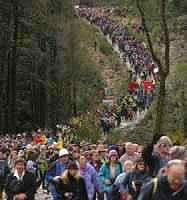
~ On Winning ~ by Deborah Beach Giordano
What is Truth?
 In our Scripture lesson Jesus tells Pilate that anyone who knows the Truth will understand what His message. Pilate clearly has no idea what the Lord is talking about; he considers the truth to be relative: a flexible concept that changes, depending on who is in power. He thinks in terms described in the old joke: “What’s the Golden Rule? It’s that the guy with the gold makes the rules.”
In our Scripture lesson Jesus tells Pilate that anyone who knows the Truth will understand what His message. Pilate clearly has no idea what the Lord is talking about; he considers the truth to be relative: a flexible concept that changes, depending on who is in power. He thinks in terms described in the old joke: “What’s the Golden Rule? It’s that the guy with the gold makes the rules.”
In many ways Pilate is pitiable; a bureaucrat so entrenched in the system that he has lost any notion of what is right and just. What he considers “good” is what’s good for the empire: whatever it takes to keep the powerful in power; no matter how hurtful or costly for the people. He doesn’t care about doing God’s will, but Caesar’s.
Thy Kingdom Come
Jesus speaks in the same terms; as if there are dual — dueling? — kingdoms: His, dedicated to compassion and care for one another; and an “earthly” one based on cynicism and expediency. Did the Lord himself consider the two to be permanently at odds, eternally separated; one evil, the other blessed? Or has he given us hope for the world’s redemption?
After all, he did teach us to pray that it may be “on earth as it is in heaven.”
The Messiah was the long-anticipated herald of a New Age: his arrival signaled God’s Reign breaking through in real time: no longer a prediction or a distant hope, but a Promise fulfilled. The Radiant One came into the world to bring an entirely new set of ground rules unlike any we’ve ever experienced before — and certainly unlike the Powers teach us to pursue.
 When Jesus says his kingdom isn’t of this world, he’s not saying it is some kind of impossible dream: a return to Eden fantasy that could never come true. Those who belong to His kingdom are called to show forth a new way of living, following a value system based on the love of God — not the love of money or power.
When Jesus says his kingdom isn’t of this world, he’s not saying it is some kind of impossible dream: a return to Eden fantasy that could never come true. Those who belong to His kingdom are called to show forth a new way of living, following a value system based on the love of God — not the love of money or power.
And he uses a delightful term in this passage that I want to call to your attention. The Lord does not refer to those who follow him as his “servants,” or his “disciples,” or even his “friends.” Jesus calls us his “helpers.”
Who Wins?
When we squabble and struggle amongst ourselves, fighting and challenging each other at the most basic level (“I wish s/he were dead!”), refusing to even listen to those with whom we disagree — we are not helping the Lord. Instead, we’re working for The Other Side.
 When we succumb to the belief that there are “winners and losers,” that success can be achieved by devious and destructive methods, that “nice guys finish last,” we’ve sadly missed the Lord’s Message. Regardless of what television programs may present, human progress is marked by cooperation and friendships, not competition and enmity.
When we succumb to the belief that there are “winners and losers,” that success can be achieved by devious and destructive methods, that “nice guys finish last,” we’ve sadly missed the Lord’s Message. Regardless of what television programs may present, human progress is marked by cooperation and friendships, not competition and enmity.
Our unfaithfulness to Christ’s Call takes a toll on our health. Surrounded by perceived enemies, driven to compete against everyone, to suspect everyone, to fear everyone, we develop chronic illnesses, and rates of depression and anxiety disorders soar. Pharmaceutical companies rack up profits while our communities, our families, and our lives disintegrate.
The Good News
That the Sunday dedicated to the Reign of Christ should lead in to Thanksgiving week is wonderfully appropriate. For it is in giving thanks — in developing “an attitude of gratitude” — that our hearts are opened to the Ultimate Truth that Jesus spoke about.
When we learn to look at the world with grateful, Christ-inspired eyes, we will see beauty, grace, and abundant blessings all around. We will recognize and give thanks for the ways in which we are interconnected in amazing, precious and life-giving ways.
It begins with simple thankfulness.
Mashed Potatoes
 A friend recently told me about her family Thanksgiving tradition, in which each person at the table names one thing for which he or she is particularly grateful. One year one of the children said that he was grateful for mashed potatoes, which everyone thought was hilarious. The young man is now in his 30s, and every year he says he’s grateful for mashed potatoes: it’s become part of the tradition.
A friend recently told me about her family Thanksgiving tradition, in which each person at the table names one thing for which he or she is particularly grateful. One year one of the children said that he was grateful for mashed potatoes, which everyone thought was hilarious. The young man is now in his 30s, and every year he says he’s grateful for mashed potatoes: it’s become part of the tradition.
The story struck me as particularly profound, the way oracles spoken “out of the mouths of babes” can so often be.
Potatoes: we take them for granted, these lowly roots; they are cheap, plentiful, and simple to prepare. But how does our lowly potato come to be at our Thanksgiving table?
If we trace the potato’s story from its beginning, we will meet the farmer who planted the crop, we will see the rich dark soil, feel the warm sunshine and cool rains that fell on the budding plants, watch the harvesters as they collect and sort the potatoes. We will learn the name of the driver of the big rig that hauled the crop to the distribution center, and that of the clerk who checked off the delivery. Then perhaps we’ll discover one or two more truck drivers, the produce clerk at the grocery store, the checker, the family member who shopped for the groceries, and finally there will be the chef who cooked and mashed the potatoes.
 If we look deeper, we’ll find our lives interwoven with those who assembled the truck that carried the potatoes; the designer, contractor, and construction workers who built the grocery store; the people who manufactured the shopping cart, the grocery bags, the twist-ties used to close the produce bags....
If we look deeper, we’ll find our lives interwoven with those who assembled the truck that carried the potatoes; the designer, contractor, and construction workers who built the grocery store; the people who manufactured the shopping cart, the grocery bags, the twist-ties used to close the produce bags....
The connections are nearly endless. And every one of them deserves our blessings and gratitude — even if the only thing we’re thankful for is mashed potatoes. Just imagine the many blessings that will abound when we’re aware of everything that is grand and good in our lives!
What’s Real and True
The world is full of good people doing their best; loving their families, longing for peace. The stinkers are few — and, alas, often in positions of control. But their power is only an illusion, maintained through deceit.
When we look at life with a thankful heart we will realize that Jesus’ kingdom is not the “better” kingdom — His is the only kingdom that is real. The aggression-fueled, competitive and fear-filled construct of the Powers is a lie intended to confuse and mislead us. The Absolute Truth and Ultimate Reality is love and life and joy and we, Jesus’ helpers, are to live in the light of that Gospel truth.
There is no “us” and “them” — there is only the human family. That farmer who grew the potatoes; the assembler at the truck factory; the clerk at the grocery store are all part of our family; yours and mine. And God’s.

For our large and complicated family, for the great Good News of Jesus Christ, for mashed potatoes and all of the other blessings that abound in God’s glorious world, may we always be thankful.
Virtual hugs and real-time blessings,
Deborah +
Suggested Spiritual Exercise
What are you thankful for? How many connections to other people, to nature, and creation can you trace to this opportunity for gratitude? Is God good, or what?